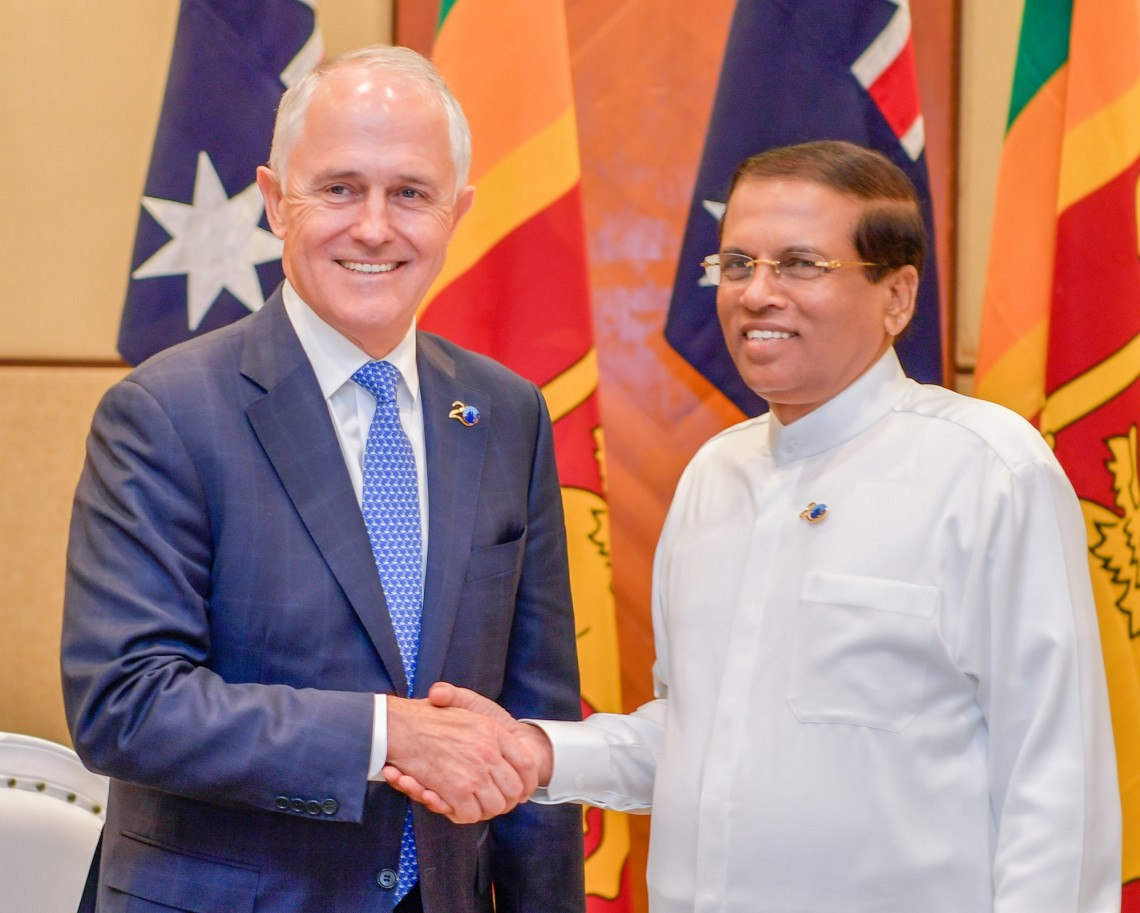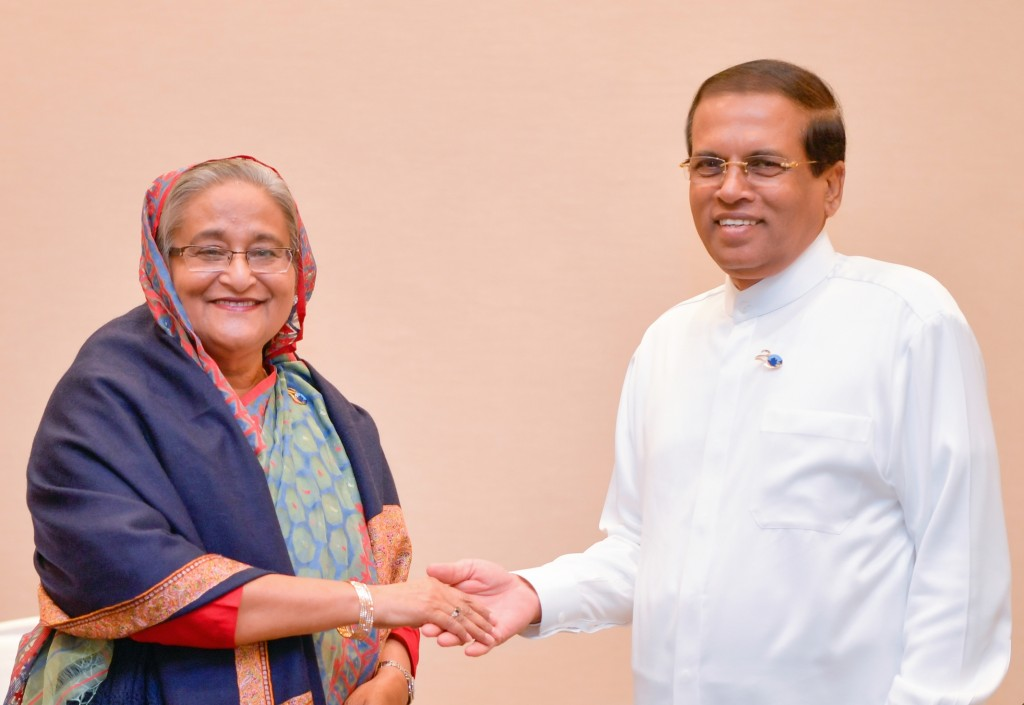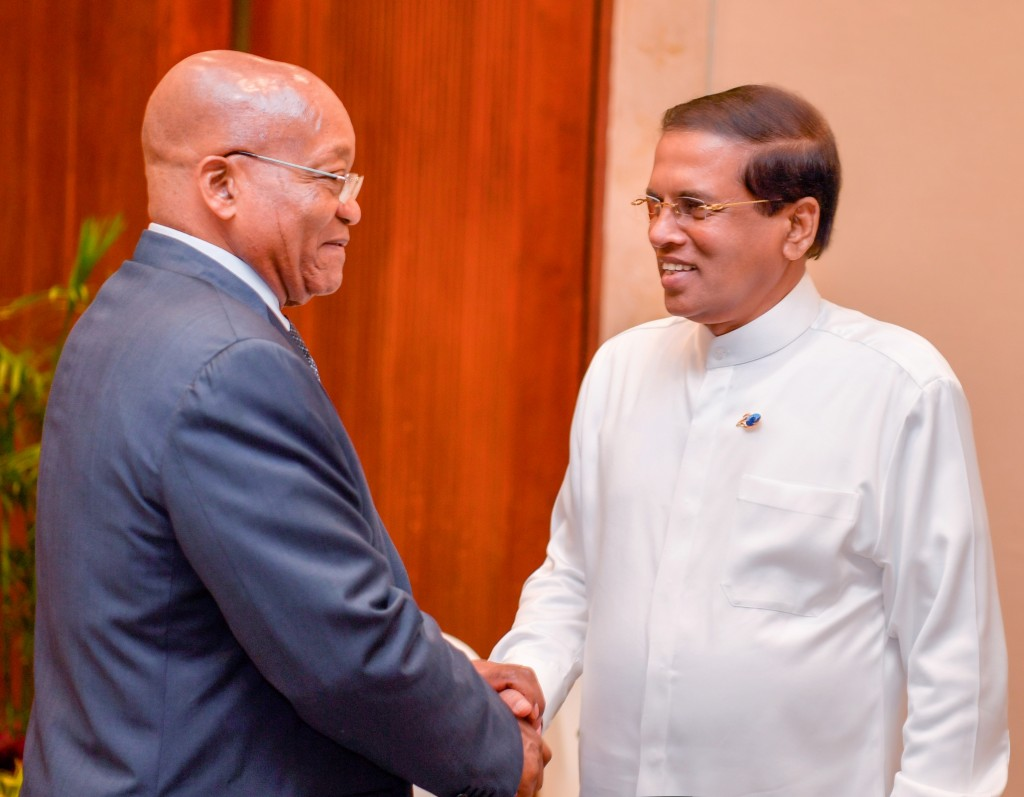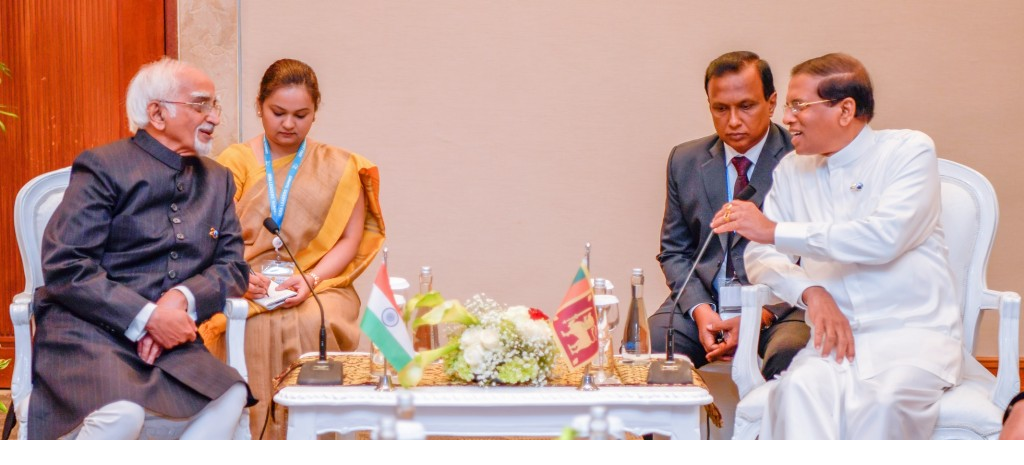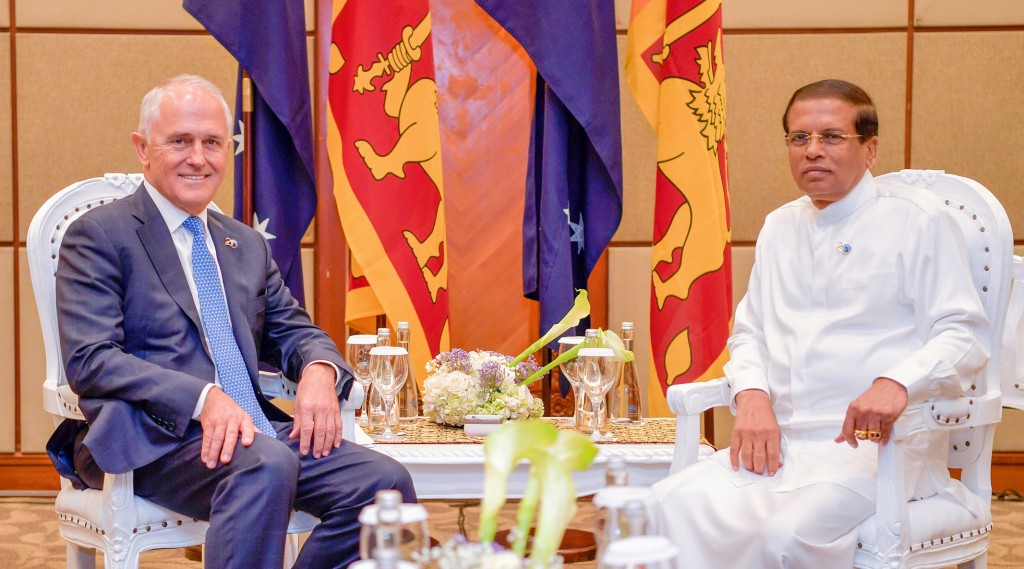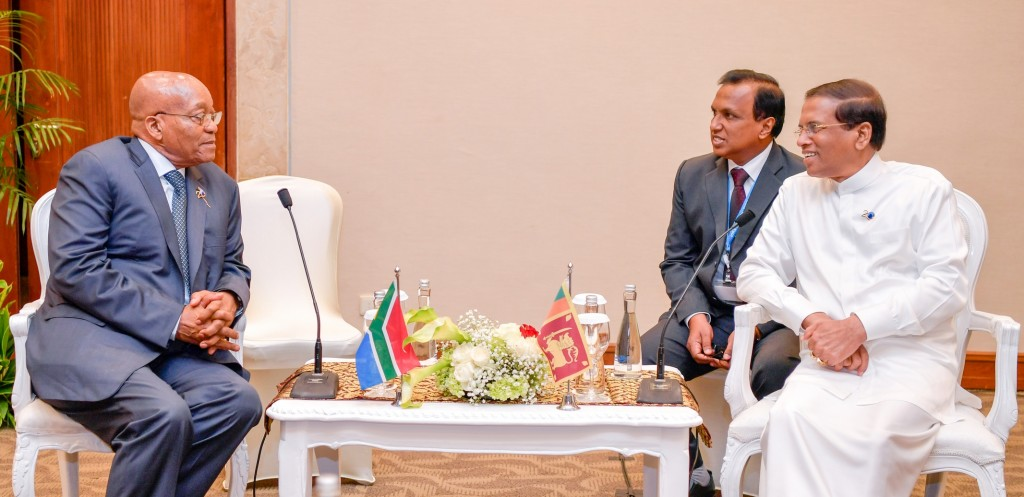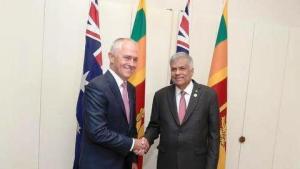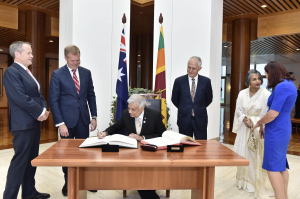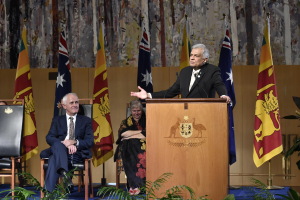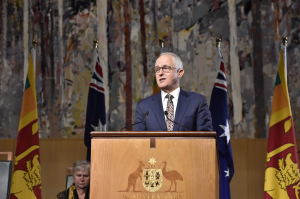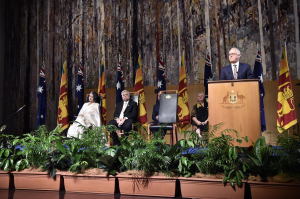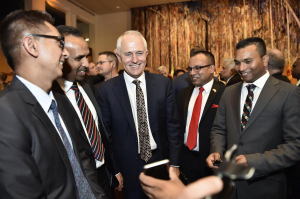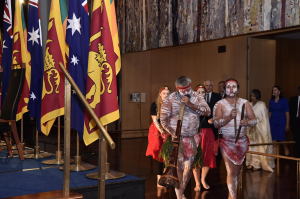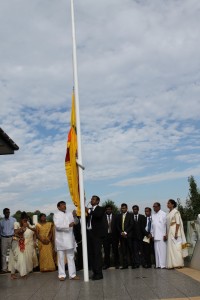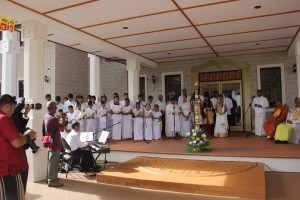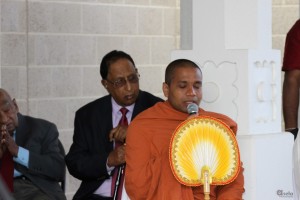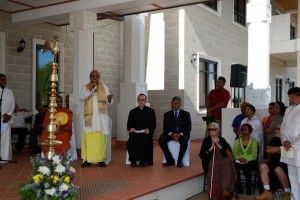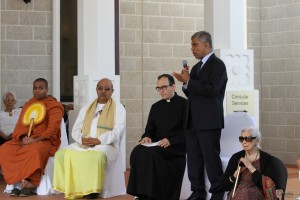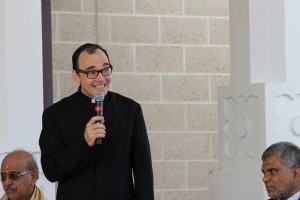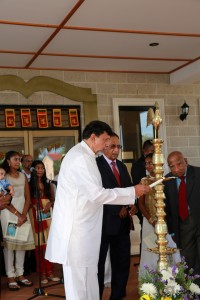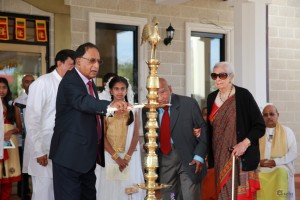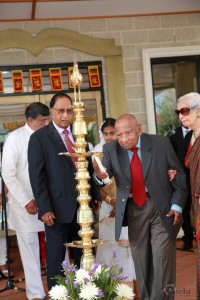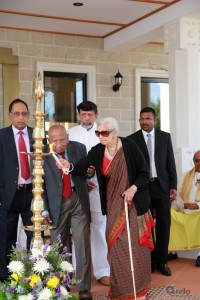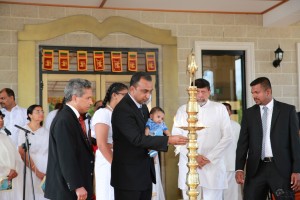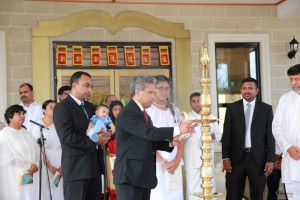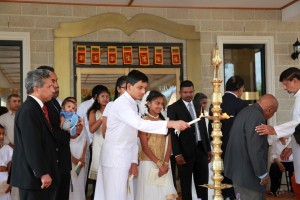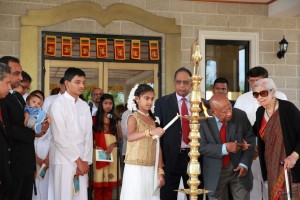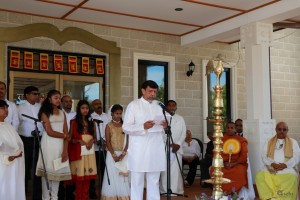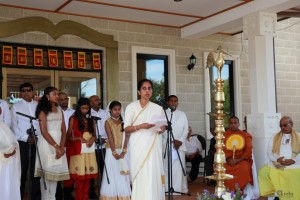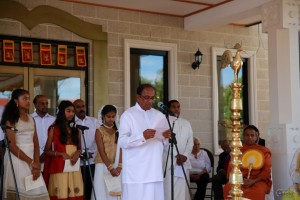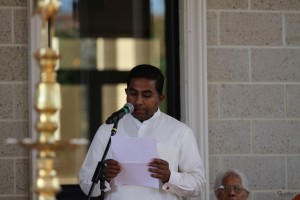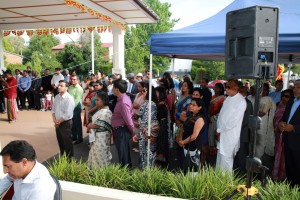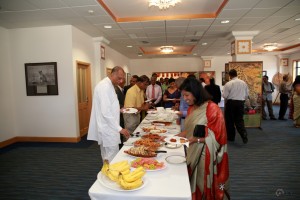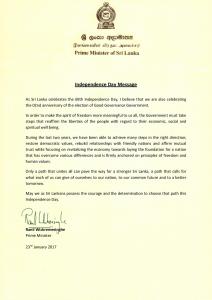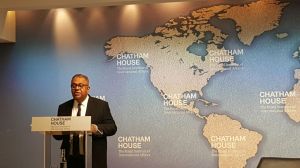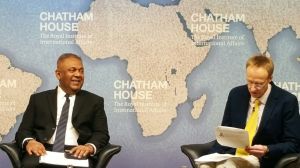


Remarks by Deputy Foreign Minister Dr. Harsha de Silva at Interactive Dialogue at the 34th Session of the Human Rights Council
March 23, 2017
Remarks by
Hon. Dr Harsha de Silva, MP., Deputy Minister of Foreign Affairs of Sri Lanka
Interactive Dialogue with the High Commissioner for Human Rights
34th Session of the Human Rights Council
Geneva, 22 March 2017
Mr. President
High Commissioner
Deputy High Commissioner
Excellencies
Ladies and Gentlemen
I thank the High Commissioner for the presentation of his Report in which many of the achievements made by Sri Lanka during the period concerned have been acknowledged.
As this Council is aware, the Minister of Foreign Affairs of Sri Lanka, Hon. Mangala Samaraweera addressed this Council on the 28th of February on behalf of the Government, and outlined what we have achieved in terms of Resolution 30/1 and beyond, what still remains to be done, and the challenges that we face in the process.
Most importantly, he stressed that Sri Lanka’s resolve to the reconciliation process has not diminished. He said – with the help of all our citizens in all walks of life, our friends and partners in the international community, and Sri Lankans overseas; with patience, understanding, and constant and consistent effort and perseverance; we strongly believe that we can make the reconciliation process a success, and establish a progressive and united society, working in harmony to take our nation towards new heights of socio-economic development.
I take this opportunity today, to reiterate our resolve and reaffirm our commitment to the reconciliation process and commitments articulated in Resolution 30/1.
As the Council is aware, Sri Lanka has been working with the United States and the other main co-sponsors of 30/1, UK, Macedonia, and Montenegro, on a Resolution for a two-year extension of the timeline for fulfilment of commitments made in Resolution 30/1. We are pleased to announce that Sri Lanka will be co-sponsoring this Resolution, and we thank the Council, the UN, and our bilateral partners for their support to strengthen reconciliation in Sri Lanka, and for this extension of the timeline.
We are especially appreciative that the Council, in recognition of the firm commitment of the National Unity Government to the process of reconciliation, accountability and human rights in Sri Lanka, endorsed the proposals made by the Government in 2015, for credible ‘Government of Sri Lanka-led’ processes embodied in Resolution 30/1.
Mr. President,
We work closely with the High Commissioner and his Office and we are committed to continuing this constructive and meaningful engagement for the benefit of all our people. The views, observations and recommendations of the High Commissioner are useful, as we work to strengthen, promote, and protect human rights, good governance, and the rule of law in Sri Lanka.
This Council knows that no country’s human rights record is perfect. It is always work-in-progress. The people of Sri Lanka have been through extremely difficult and painful times, and although much has been done, there is much still left to do, including strengthening our institutions and achieving economic progress. There are multiple challenges that we face. But, as a responsible and committed Government, under the leadership of President Sirisena and Prime Minister Wickremesinghe, we are determined to stay the course. We will listen to all, we will study all reports carefully, we will exchange information, share our concerns and comments, engage constructively and meaningfully with our partners, and take the necessary steps required to ensure that Sri Lanka is a nation that is prosperous, united in its diversity, upholding human rights, justice, and the rule of law.
We remain firm in our resolve to enhance the fundamental rights of all citizens as equals in a free and democratic country, where fear and intimidation have no place. We are committed to the reconciliation agenda including truth, reparations, justice and non-recurrence with a victim-centred approach, recognising the impact of conflict on all our citizens, irrespective of their communities of origin, gender, social status, age and other identities.
As we go through the complex process of establishing new mechanisms, we are considering the Report of the Consultation Task Force, and we will continue to consult with all segments of our society. We will also seek international expertise and assistance, as all countries do, when they undertake such responsibilities.
We request the support of all Council Members and Observers to help Sri Lanka succeed in this transformative and challenging agenda that we have undertaken, including economic development, that plays an important role in ensuring the success of the reconciliation agenda.
Thank you.
SRI LANKAN ELEPHANTS, TOURISM AND WILDLIFE
March 22, 2017
Environmentalist and Wild Life enthusiast Srilal MIththapala gave a talk on Sri Lankan Elephants, Wildlife and Tourism at the Sri Lanka High Commission in Canberra on Friday 17th March.
Wildlife enthusiasts and members of the Canberra public who came to listen to Mr Miththapala appreciated very much the informative presentation which provided an overall view of Sri Lanka’s tourism with a special focus on wildlife.
Sri Lanka is home to the largest animal on land, the elephant, and the largest mammal on earth, the Blue Whale, as well as the Sri Lankan Leopard and Sloth Bear. Despite its small size, Sri Lanka is an island with rich bio diversity and is home to a large number of species that are endemic to Sri Lanka.
The highlight of the presentation was the Sri Lankan elephant: Elephas maximus maximus,, which is one of the three recognised sub species of the Asian elephant and is native to Sri Lanka.
Mr Miththapala described the quasi-religious status of the elephant in Sri Lankan society: elephant behaviour: and the importance of this animal to Sri Lanka’s wildlife and tourism industry.
He concluded by discussing the issues surrounding human elephant conflict resulting from the decreasing forest cover and human settlements in elephant habitats.
The full presentation can be viewed here:
Correction: Slide 2 – Languages: Sinhala (official) Tamil (official)
DFAT wins the 50th Anniversary match for the General Anton Muttukumaru trophy at Duntroon
March 21, 2017
The 50th anniversary cricket match for the General Anton Muttukumaru trophy, which is played between the Commonwealth represented by Canberra based High Commissions and the Department of Foreign Affairs and Trade was won by the DFAT team at Duntroon on Sunday 19th March 2017. The match is jointly organised by the Royal Commonwealth Society, Sri Lanka High Commission and DFAT.
President holds bilateral discussions with several leaders during IORA Summit
March 9, 2017
President Maithripala Sirisena met with several heads of state and other leaders during his participation at the Indian Ocean Rim Association Leaders’ Summit held today (07) in Jakarta, Indonesia.
During these meetings the President drew his special attention to further strengthen the trade and economic relations between Sri Lanka and those countries, and the leaders who met the President today assured their fullest support to Sri Lanka which move forward with new plans.
First, the President met with the Indian Vice President Mohammad Hamid Ansari.During the meeting the Indian Vice President expressed his happiness over the forward march of the India-Sri Lanka relations in a fresh sphere under the leadership of the President Maithripala Sirisena.He also pledged to provide full assistance for the development works of Sri Lanka as a friendly neighboring country.
He further said that the initiatives taken by the President Sirisena to establish peace and reconciliation among communities while build the country as an independent and sovereign state,is an exemplary process.
The President expressed his gratitude for donating rice to Sri Lanka, as part of drought relief for the country .
Later, the President met with the South Africa President Jacob Zuma. During the meeting, both leaders discussed ways to strengthen Sri Lanka- South Africa ties, and the President appreciated the assistance extended to Sri Lanka by South Africa in international fora.
South Africa President commended the initiatives taken by the President Sirisena to establish sustainable peace in Sri Lanka. The South Africa President Jacob Zuma promised to provide every possible assistance to Sri Lanka in international affairs as well as other sectors.
The President also met with the Australian Prime Minister Malcolm Turnbull. The Australian Prime Minister stated that Australia has been a long-term consistent friend to Sri Lanka and the frequent meetings between the leaders of the two countries further strengthen those relations.
During the meeting it was discussed regarding the development works of the energy sector of the country and the Australian Prime Minister pledged to provide required technical assistance to Sri Lanka in this regard.
He also said that the Australia is ready to move forward with Sri Lanka in the fields of the economic and trade. The Australian Prime Minister also extended an invitation to the President to visit Australia.
Subsequently, the President met with Bangladesh Prime Minister Sheikh Hasina. During the meeting both leaders stressed the importance of strengthening the ties between the two countries and she further said that Bangladesh is ready to enter into new economic and trade relations with Sri Lanka. President Sirisena also said that he will send a special team to Bangladesh to explore the ways in enhancing the trade and economic relations between the two countries.
President Sirisena also expressed his happiness over effective workings of the initiatives that has been taken with Bangladesh in relation to the health sector of the country when he was the Health Minister.
Bangladesh Prime Minister Sheikh Hasina invited the President to visit Bangladesh.
JOINT STATEMENT BY THE PRIME MINISTERS OF AUSTRALIA AND SRI LANKA
February 16, 2017
Hon. Ranil Wickremesinghe, Prime Minister of the Democratic Socialist Republic of Sri Lanka paid an official visit to Australia from 13 -17 February 2017 at the invitation of Hon. Malcolm Turnbull, Prime Minister of Australia, accompanied by Hon. Wijith Wijayamuni Zoysa, Minister of Irrigation and Water Resources Management, Hon. Arjuna Ranatunga, Minister of Ports and Shipping and Hon. (Dr). Harsha de Silva, Deputy Minister of Foreign Affairs.
Prime Minister Turnbull warmly welcomed Prime Minister Wickremesinghe on his first official visit to Australia to mark the 70th anniversary of diplomatic relations.
Prime Ministers underlined our strong historical ties, common values and shared interests – including a commitment to democracy, the rule-of-law, and support for a stable, liberal rules-based international order.
Prime Ministers commended the sustained efforts of both nations to build on these foundations to realise the benefits of closer cooperation. They welcomed strong achievements, particularly in countering people smuggling and strengthening people-to-people links. They underlined new opportunities to expand the economic relationship presented by Sri Lanka’s ambitious economic reform agenda, deeper integration with the global economy and progress toward becoming an important Indian Ocean economic hub.
Prime Minister Turnbull commended Sri Lanka on its strong economic growth and considerable progress toward national reconciliation since the end of the conflict in 2009. As a close friend and Indian Ocean neighbour, Australia will continue to stand with Sri Lanka on this journey, including through lending practical support for reconciliation measures.
Prime Ministers underlined the importance of continuing to counter the illegal people smuggling trade, which puts vulnerable peoples’ lives at risk and enriches criminal networks. They emphasised their commitment to detect and deter people smuggling ventures and to strengthen the close working relationship between agencies.
Prime Ministers reiterated our shared interest in regional stability. As Indo-Pacific neighbours, Indian Ocean Rim Association (IORA) members and trading nations, both countries benefited from a peaceful and secure maritime domain. Prime Ministers committed to closer cooperation and engagement in the Indo-Pacific to help create a more prosperous and secure region.
The Prime Ministers emphasised the significant opportunities of greater trade and economic integration in the Indo-Pacific region to both countries and their continued commitment to work together in building regional trade. In this regard, Prime Ministers noted the Kotte Statement on International Trade and Investment adopted by CHOGM 2013 in Colombo and welcomed opportunities to deepen trade and investment links.
Prime Ministers underlined opportunities to expand two-way trade and investment, particularly in agribusiness, mining, skills, tourism and energy.
Prime Ministers discussed new and growing opportunities for greater energy cooperation. They noted Sri Lanka’s changing energy requirements and that Australia was a major global energy supplier. Australian companies could play a role in securing energy supply to fuel the next stage of Sri Lanka’s economic development. They noted investment in energy infrastructure could be a major driver of economic growth in Sri Lanka in the future.
Prime Ministers noted strong and growing education ties, which boost the human capital of both countries. Many Australian education providers are active in Sri Lanka, including delivering high quality education and conducting research with local partners. Around 7,600 Sri Lankans are currently studying in Australia. Australia has sent around 300 New Colombo Plan participants to study in Sri Lanka since 2015 including in health, science, architecture, information technology, commerce and law.
Prime Ministers reiterated their commitment to ongoing defence engagement, particularly on maritime security. Strong navy-to-navy links and increasing defence student exchanges were a highlight of the bilateral relationship.
Prime Ministers agreed Australia and Sri Lanka’s longstanding development partnership had made an important contribution to Sri Lanka’s growth and prosperity during the past 70 years. Prime Minister Turnbull reiterated Australia’s strong ongoing commitment to assisting the Sri Lankan Government achieve its inclusive development goals, including through developing skills and opportunities for small business, boosting trade competitiveness and encouraging greater participation of women in the workforce. Reflecting this commitment, Prime Ministers welcomed the signing of a new MoU for a Development Cooperation Partnership.
Prime Ministers emphasised the positive role of our extensive people-to-people links, which were the foundation of our warm bilateral relationship. Australia’s large Sri Lankan community – drawn from all ethnicities – had made a significant contribution to many different sectors of Australian society and economy. They noted overseas Sri Lankans, including those based in Australia, could make a significant contribution to Sri Lanka’s future development.
Prime Ministers launched the tour of Australia by the Sri Lankan cricket team and noted the role of sporting exchanges in the bilateral relationship. They also welcomed the signing of aMoU on Cooperation in Sport to deepen cooperation between professionals in cricket, basketball, swimming, volleyball, tennis, boxing, rugby, cycling, golf and baseball, as well as in sports integrity measures.
Prime Minister Wickremesinghe thanked Prime Minister Turnbull for the warm hospitality extended to him and his delegation by the Australian Government.
Prime Minister Wickremesinghe extended an invitation to Prime Minister Turnbull to visit Sri Lanka at a mutually convenient time.
Photo Courtesy : Michael Masters/Auspic
Sri Lanka High Commission celebrates 69th anniversary of Independence in Canberra
February 6, 2017
Sri Lanka High Commission in Australia celebrated the 69th anniversary of Independence on 4th February at the High Commission premises with the participation of over 300 Sri Lankans in Canberra.
After the hoisting of the National Flag by High Commissioner Skandakumar, school children supported by adults sang the National Anthem in Sinhala and Tamil which was followed by two minutes silence to honour all those who sacrificed their lives for the Independence , sovereignty and territorial integrity of Sri Lanka.
Clergy representing the Buddhist, Hindu, Christian and Islam faiths, invoked blessings on the people of Sri Lanka.
Thereafter, the National Day Messages of President Maithripala Sirisena, Prime Minister Ranil Wickremesinghe and Foreign Minister Mangala Samaraweera were read out.
Addressing the large gathering High Commissioner Skandakumar said that the messages explicitly outlined the national unity Government’s vision for the ensuing year.He thanked the community for their participation at all events conducted by the Mission and recalled that the success of the Sri Lankan festival held at the Mission on 12th Nov 2016 was an indication of what was possible when we came together and supported each other.
He reflected on the commendable cross nation walk a few years ago from South to North that enabled a cancer hospital to be built in Tellipalai and an identical initiative by equally dedicated Srilankans of all ethnicities and religious faiths who covered over 600 kilometres in the month of October 2016, to raise funds for a similar facility in the South. These projects he said underlined the true meaning of unity and reconciliation and impacted our people deeply. The High Commissioner related an incident associated with that walk where a disabled beggar seated on the road with crutches by his side, donated his day’s collection to the project, touching the hearts of all.
All of these he said remind us that we are indeed a nation of caring and compassionate people and expressed the hope that a year from now when we celebrate our 70th year of Independence, we can each look back on the preceding twelve months and say with conviction that we did make a sincere contribution to the Government’s pledge for Peace, and reconciliation.
Sri Lanka High Commission
Canberra
4th February 2017
Independence Day Messages
February 4, 2017
Independence Day Message of the President
Many freedom struggles of humankind have aggrandized the story of human progress. We Sri Lankans too have inherited a long history of such struggles, that brings forth memories of grief and glory, from the times of our Kings to that of modern democracy. The nation is indebted to our forebears, whose selfless sacrifice of sweat and blood have brought about the freedom, in which we breathe today.
It is at a challenging and decisive moment, that we celebrate the 69th Independence anniversary this year. The responsibility of strengthening the recently secured democratic freedom, as well as ensuring that, enriched by indigenous wisdom, so that all communities could live with dignity, lies on our shoulders. We have been able to overcome a dark era and reillumine our unsurmountable aspirations for democracy, freedom, and human dignity. However, the realization of the true meaning of freedom and independence lies in our potential to free ourselves from the shackles of all kinds and forms of poverty, ill-health, and confines of divisive identities of race, religion and caste, and enrich ourselves, as a society that values equity and rights of all.
We are a nation that deserves to live a prosperous life in a country where peace and justice and equality prevail.
It is my sincere wish that we continue to prosper by vanquishing ignorance by knowledge, untruth by truth, hatred by compassion and violence by nonviolence and become a compassionate nation.
Maithripala Sirisena
President of the Democratic Socialist Republic of Sri Lanka
February 04th, 2017
Message in Sinhala Message in Tamil Message in English
Independence Day Message of the Prime Minister
Message in Sinhala Message in Tamil Message in English
Independence Day Message of the Minister of Foreign Affairs
On the sixty-ninth anniversary of Sri Lanka’s Independence, I extend warm greetings to all Sri Lankans and persons of Sri Lankan origin who live and work across the world in different capacities.
Our Nation’s journey since the 4th of February 1948 has been mixed with achievements that we can be proud of, as well as challenges fraught with pain and anguish.
Following the decisive step taken under the leadership of President Maithripala Sirisena and Prime Minister Ranil Wickremesinghe, to form a National Unity Government, we proceed on the path of formulating national policies required to ensure our nation’s progress as a strong democracy, where good governance, the rule of law, individual rights, justice, freedom, and the dignity of all are upheld; the multi-ethnic, multi-cultural, and multi-religious nature of our country is cherished and celebrated; where all forms of discrimination are denounced; and we build a strong nation with equitable economic development, that would be at peace with itself and with the world, working together with the international community for the benefit of all.
The path we have chosen for ourselves is a challenging one. The task of nation-building is one that requires dedication and commitment of all Sri Lankans living both in Sri Lanka and overseas.
As we approach the seventieth year of our Independence, I urge all of you to seize this historic moment in our nation’s history to contribute your strengths, your goodwill, your energy, skills and wisdom, to build an inclusive and prosperous nation that is reconciled and at peace so that we march forward as the brothers and sisters of one family, with respect towards all, to ensure the non-recurrence of conflict and build the Sri Lanka of our dreams as proud citizens.
Mangala Samaraweera, MP
Minister of Foreign Affairs
Regional Consular Office of Foreign Ministry to be opened in Jaffna
January 25, 2017
Following the vision of President Maithripala Sirisena and Prime Minister Ranil Wickremesinghe, of enhancing the efficiency and effectiveness of service delivery to the public, the Ministry of Foreign Affairs will open a Regional Consular Office in Jaffna on Thursday 26 January 2017 at 10.30 a.m.
The Consular Office which will be located at the District Secretariat in Jaffna, will be declared open with the participation of Foreign Minister Mangala Samaraweera, Leader of the Opposition R. Sampanthan, the Governor of the Northern Province Reginald Cooray, Chief Minister of the Northern Province, C.V. Wigneswaran, Minister of Prison Reforms, Rehabilitation, Resettlement and Hindu Religious Affairs D. Swaminathan, Minister of Industry and Commerce Rishad Bathiudeen, and State Minister of Women & Child Affairs Vijayakala Maheshwaran.
The Regional Office will provide a range of consular services to the public that were previously provided only through the Office at the Ministry of Foreign Affairs in Colombo. Services provided by the Regional Office will range from attestation of birth, marriage and death certificates as well as educational certificates for their use abroad; extending assistance to family members of Sri Lankans who may be stranded abroad; facilitation of redress and compensation claims of families of migrant workers; and repatriation of human remains from abroad.
Regional Consular Office of the Ministry of Foreign Affairs
District Secretariat, Kandy Road, Jaffna
Operating Hours : Monday to Friday: 8:30a.m. to 4:15 p.m.
Telephone : 00 94 21 2215970
Fax : 00 94 21 2215972
Email : Jaffna.consular@mfa.gov.lk
Ministry of Foreign Affairs
Colombo
24 January 2017
Australia lowers the Sri Lankan Travel Advisory to reflect improved security environment
January 16, 2017
Australia has lowered the Sri Lanka Travel Advisory from the previous Level 2, to Level 1, which advises travellers to “Exercise normal safety precautions”.
The official Smartraveller website states that “The level of the advice has decreased to ‘exercise normal safety precautions to reflect the improvements in the security environment in Sri Lanka.”
The updated Travel Advisory can be viewed at http://smartraveller.gov.au/Countries/asia/south/Pages/sri_lanka.aspx
“The Reconciliation Process in Sri Lanka” Remarks by Foreign Minister Mangala Samaraweera at the Royal Institute of International Affairs, London
January 14, 2017
Remarks
by
Hon. Mangala Samaraweera, MP
Minister of Foreign Affairs of Sri Lanka
The Royal Institute of International Affairs, London
Wednesday 11 January 2017
The Reconciliation Process in Sri Lanka
Mr. Chairman, Professor Jonathan Goodhand,
High Commissioner for Sri Lanka, Mrs. Amari Wijewardena,
Distinguished Invitees,
Ladies and Gentlemen,
Friends,
It is indeed an honour to speak at the historic Chatham House today, as one of the first speakers in the New Year. May I also take this opportunity to congratulate all of you at the Royal Institute of International Affairs for being chosen as the, “Think tank of the year by Prospect Magazine” which commended your work as “Reliably excellent” and a “Gold Standard of knowledge and professionalism”.
The topic on which I speak today – ‘The Reconciliation Process in Sri Lanka’, in fact holds special significance for us Sri Lankans this week. This is because, the Cabinet of Ministers recently declared this week, from January 8th to the 14th, as the ‘National Integration and Reconciliation Week’. This coincides with the completion of two years since the historic Presidential election of January 8th 2015, and this is the first occasion on which this annual National Integration and Reconciliation Week is being observed in my country.
As one of the main features of this Observance, on 9th January, in schools and state institutions including in Parliament, a Pledge for National Integration and Reconciliation was read out,
-resolving to work together, hand in hand, while respecting the richness of our diversity, to foster peace, understanding, mutual trust, and brotherhood; a new Sri Lanka united in it’s diversity.
Ladies and Gentlemen,
Several of my predecessors too have spoken here at the Chatham House. This includes the late Mr. Lakshman Kadirgamar who spoke at length here, in 1998, about the danger faced by our nation at the time, and democratic societies everywhere, from terrorism.
Almost twenty years later, I feel fortunate to be here representing a country where the guns and the bombs have finally fallen silent.
Although the violence ended in May 2009, the healing of wounds of over two decades of conflict, achieving reconciliation and national integration, catching up on economic progress and development that eluded us due to conflict, and ensuring non-recurrence, remain challenging tasks for our Nation. Similarly, the tasks of improving governance, institutions, rule of law, and putting in place necessary measures to strengthen, promote and protect individual rights; while ensuring the dignity of all and building a truly national identity while preserving our pluralistic society – remain work in progress.
Ladies and Gentlemen,
This week, 2 years ago on the 8th of January, the people of Sri Lanka courageously turned out to vote across the country to end authoritarianism, corruption and the politics of hate; they voted for a new democratic Sri Lanka where democracy, reconciliation, the rule of law and sustainable development would flourish.
This courageous decision by the people of Sri Lanka enabled us, for the first time in our country’s history, to form a Government of National Unity, bringing together, the two main political parties – the Sri Lanka Freedom Party headed by President Maithripala Sirisena, and the United National Party headed by Prime Minister Ranil Wickremesinghe.
Having achieved a significant number of promises set out in the 100 Day Work Programme of the Government, the most significant being the repeal of the 18th Amendment to the Constitution, and the adoption of the 19th Amendment, fresh Parliamentary elections were called in August 2015.
The 19th Amendment, as most of you I am sure are aware,
– Re-introduced the two-term limit of the Presidency,
– Reduced the term of the Presidency from 6 to 5 years,
– Established a Constitutional Council,
– Restored Independent Commissions,
– Recognised the Right to Information as a fundamental right, and
– Recognised the Promotion of National Reconciliation and Integration as duties of the President.
The Government also had in its hands, the task of restoring Sri Lanka’s relations with the outside world, and restoring lost credibility.
The Government, since January 2015, therefore, started reaching out to the international community, re-engaging with governments and international organisations.
The power of Parliament has been strengthened. Oversight Committees have been set up with Opposition members chairing several key Committees.
The Right to Information Act, which was enacted by Parliament last year and is now in the process of being operationalized.
Ladies and Gentlemen,
In two years Sri Lanka has made considerable strides from soft-authoritarianism towards consolidating a rights-based democracy with deeply entrenched institutions and values.
We are convinced and we recognize clearly, that societies that avoid looking at the past, fail to build sustainable peace. Sri Lanka has suffered conflict several times both in the South and in the North. There is hardly anyone in Sri Lanka who can claim to have not been affected by conflict. We know that traumatic memories don’t simply vanish and we have learned, through experience since Independence that grievances that are left unaddressed, can go on for generations, becoming entrenched, and holding the risk of descending into cycles of violence.
It is these realizations that cry out to us that our nation will never be able to achieve the full socio-economic development potential that our nation can reach, and our citizens are so deserving of, if we fail to address grievances, that risk plunging our nation into conflict once again, that led us to co-sponsor the Resolution that we worked on with members of the Human Rights Council in October 2015. The content of the Resolution is based on commitments that we ourselves as a Government, made to our people, and proposals that we presented to the Council based on the Lessons Learnt and Reconciliation Commission Report, the Paranagama Commission Report and advice of our experts.
As the President said in his Independence Day speech in February last year, Sri Lanka is committed to the implementation of that resolution so that we as a country can deal with the past honestly and truthfully, accept that past, put it behind us, and then move forward to build our Sri Lankan nation anew.
The set of actions that the Government has identified to deal with the past in a comprehensive manner, addressing the grievances of all victims, include truth seeking, justice, reparation and measures for guaranteeing non-recurrence. As a first step, we have enacted legislation to set up an Office on Missing Persons. Now that the Consultation Task Force set up to seek the views of the public has just handed over its Report to the Government on the 3rd of January, the relevant experts of Government, in an exercise coordinated by the Secretariat that has been set up to Coordinate the Reconciliation Mechanisms will be studying the Report and finalizing the designing of a Truth-Seeking Commission and a Reparations Office.
As some of you may be aware there are divergent views even within the government in respect of the participation of foreign judges in the proposed judicial mechanism.
However, despite this divergence of opinions, there is a clear consensus across the board on the need of an independent and credible domestic mechanism as promised by the manifesto of President Maithripala Sirisena. As a democratic and sovereign government, we will work out the architecture of such a mechanism in consultation with all the stake holders.
Among the various multiple tasks, we have undertaken include the drafting through a consultative and inclusive process, of a National Human Rights Action Plan for the next five years beginning from this year (2017-2021).This draft Action Plan is currently before Cabinet.
As you are aware, Missing Persons is a phenomenon that has plagued Sri Lanka for long years. Apart from steps being taken to set up the permanent Office on Missing Persons, we have also become parties to the International Convention for the Protection of All Persons from Enforced Disappearance. The draft enabling legislation to give effect to the provisions of the Convention is also presently before the Cabinet.
Ladies and Gentlemen,
As you are aware, one of the first steps taken by the National Unity Government in January 2015 itself was to restore civilian administration in the North and the East of the country. We have also taken a series of symbolic steps to establish equality of all citizens, such as singing the National Anthem in both Sinhala and Tamil; promising the people to ensure that we don’t allow our country to plunge into conflict and the shedding of blood of our citizens by adopting a Declaration of Peace on Independence Day in February 2015; and observing the National Integration and Reconciliation Week annually, beginning from this week.
As an important measure to prevent non-recurrence of conflict, the Parliament, last year, unanimously adopted a Resolution for the Parliament to sit as a Constitutional Assembly to draft a new Constitution that would, among other provisions.
Much of the preparatory work for the new constitution has now been completed. Wide-ranging public consultations were conducted for the first time in Sri Lanka’s constitutional history; much study, reflection and negotiation was undertaken to arrive at consensus at the six sub-committees set up and final negotiations on a draft are currently underway.
Right now, the President’s party, the SLFP, and the JVP have asked for time to present their respective final proposals. The Interim Report therefore is expected to be tabled in the Constitutional Assembly in early February, for debate.
On the developmental front, a solid foundation for economic growth, job creation and broad-based prosperity is being laid. First, the government is dealing with the white elephant economy it inherited: debt, fiscal pressures and wasteful expenditure were serious problems that have now been stabilized.
The Government’s plans of making Sri Lanka an Indian Ocean hub are beginning to bear fruit: the Colombo International Financial City; the Hambantota, Colombo East and Trincomalee Ports; and the Katunayake and Palali Airports are all hives of activity. By 2020, Sri Lanka will have the necessary infrastructure, regulations, and companies in place to achieve its hub ambitions.
Ladies and Gentlemen,
Sri Lanka has been at the cusp of breakthroughs many times before. There were much expectations from Sri Lanka at the time we gained Independence. Since then, we have been permanently at a make-it or break-it cross-roads for decades. Peace and prosperity have always been in sight and within grasp; but these many moments when history was pregnant with opportunity ended in disappointment.
But this time, there is reason to hope. The violence has finally ceased. The two main parties that have always worked against each other have now come together. The President, Prime Minister and the Leader of the Opposition are people with wisdom who know that what we have today in Sri Lanka is a unique opportunity which we simply cannot afford to miss. It is not the opportunity of the decade but the opportunity of our life-times. For the first time in Sri Lanka’s history the UNP, SLFP, TNA and Muslim parties have agreed to work together to address the root causes of conflict. We have learnt from the mistakes of the past, and we are committed to ensuring that we achieve the promise that shined so brightly at our Independence.
Our history tells us that Sri Lanka was the marvel of the ancient world when she embraced multiculturalism, openness and trade. Anuradhapura and Polonnaruwa, at their heights, were home to people of all races and creeds. A spirit of celebrating diversity prevailed, and our civilization was enriched with ideas and practices from Rome, Persia, Egypt, Greece, India, South East Asia and China. We were a connected civilization proud of our position at the centre of Indian Ocean trade.
The lessons and the choices of our history are clear to us today. We have a choice between impunity, conflict, corruption, extremism and poverty, or the rule of law, accountability, equality, multiculturalism, openness and trade. We have a choice between conflict and poverty, versus peace and prosperity.
The statement issued in Brussels earlier today by the European Commission on granting the GSP+ concession to Sri Lanka is yet another indicator of Sri Lanka moving along the right track.
Two years since the 8th of January in 2015, the National Unity Government remains steadfast in its determination to achieve the objectives it set out to achieve for our country. We have succeeded against far greater odds and more powerful foes. The challenges that we have before us are not easy ones. But determination and unity, and courage and moral fortitude drives us to embrace tough choices and endure hardship to break the cycle of missed opportunities and disappointments to achieve for our people, especially our future generations, the prosperous and peaceful land that they so deserve. We are determined to ensure our success.
That is why I say to the cynics again that there will be no U-Turn despite some detours from time to time.
Breaking from the past, we will confine those who spin webs from the threads of ignorance to the dust-bin of history; finally put prejudice, ignorance, mediocrity and opportunism behind us once and for all, and build a truly united, democratic, multi-cultural and prosperous Sri Lanka where peace, justice, equality, dignity and freedom for all, prevail.
FESTINA LENTE; slowly but surely Sri Lanka is making haste towards a new beginning.
Register with the High Commission
The Sri Lankan High Commission in Canberra would like to keep in touch with Sri Lankans and persons of Sri Lankan origin living in Australia, New Zealand, Fiji, Papua New Guinea, Vanuatu and other Pacific Islands as well as Sri Lankan community organisations in those countries.
If you are a current/former Sri Lankan or an office bearer of a Sri Lankan community organisation we invite you to register with the High Commission.
RegisterAddress
Sri Lanka High Commission
61, Hampton Circuit
Yarralumla
ACT 2600

